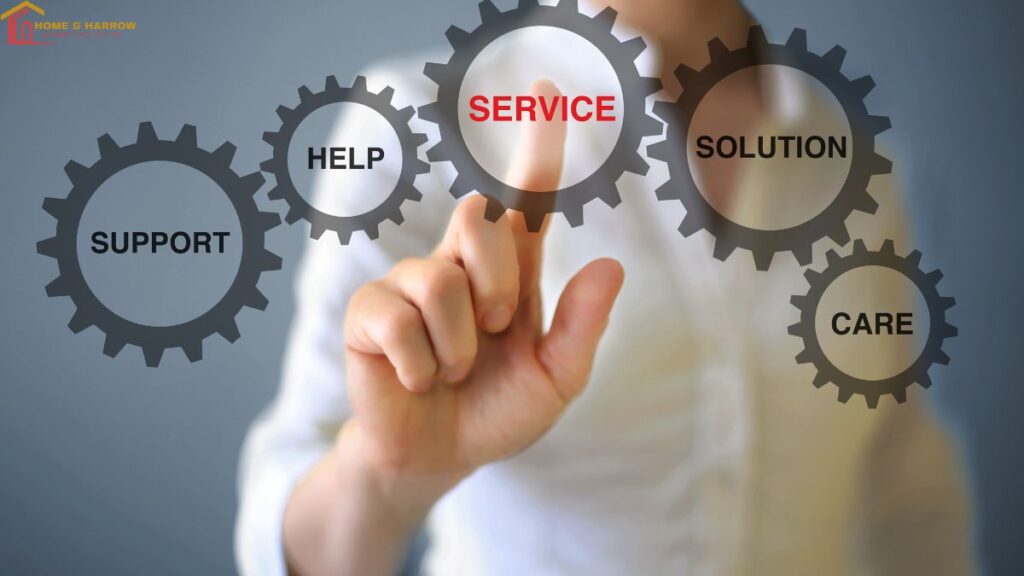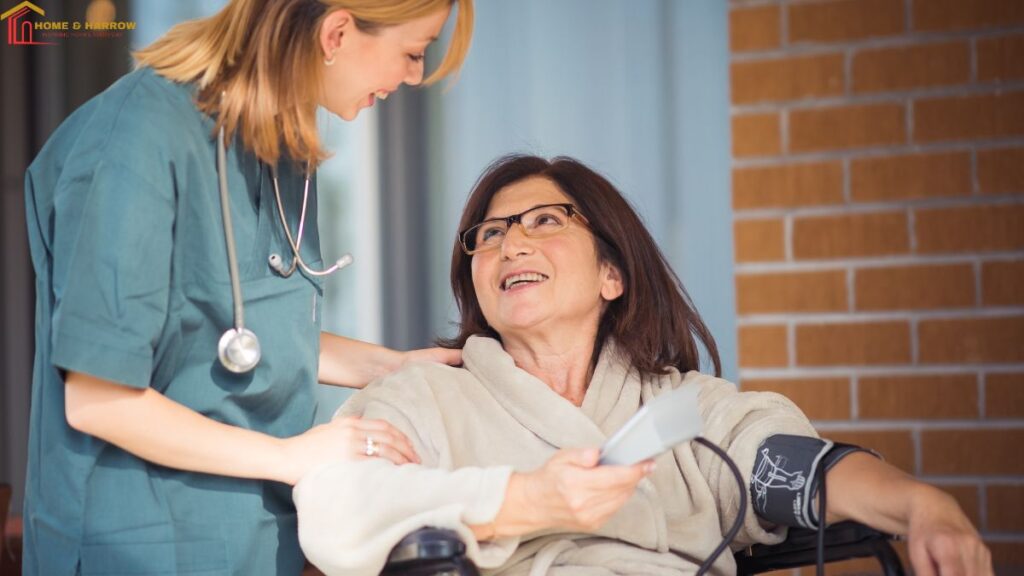Introduction
Unique home health care services the landscape of health care is going through a profound change, moving away from the standard, institutional setting and back into the heart of where life happens: the home. This shift is driven by a desire for convenience, self-reliance, and customized attention, especially among aging populations and individuals handling chronic conditions.

As we move through 2025, the development of home healthcare is not simply about bringing medical services to the doorstep; it’s about integrating ingenious, holistic, and technology-driven solutions that are improving what it means to get care. This post checks out the unique home health care services that are transforming lives, using new levels of support, self-respect, and well-being for clients and their families.
The Evolution of In-Home Care: Beyond Basic Assistance
For years, home health care mostly consisted of skilled nursing gos to for post-operative healing or basic support with activities of daily living (ADLs) like bathing, dressing, and meal preparation. While these fundamental services stay vital, the market has expanded its scope significantly. The contemporary home care design is proactive, preventative, and deeply personalized, leveraging technology and specialized training to attend to a larger spectrum of requirements.
This evolution is a response to several crucial aspects. An aging global population wants to “age in place,” keeping their independence and familiar routines for as long as possible. Furthermore, advancements in medical technology have actually made it possible to manage complicated health concerns outside of a hospital. There is a growing acknowledgment that health is not simply the lack of disease, but a state of complete physical, psychological, and social well-being. This holistic understanding has actually led the way for services that cater to the entire person.
From Reactive to Proactive: A Paradigm Shift
The core of this improvement lies in a shift from a reactive to a proactive care model. Instead of waiting for a health crisis to occur, today’s special home healthcare services concentrate on prevention, early detection, and continuous management. This involves utilizing data, technology, and customized proficiency to anticipate requirements and intervene before minor problems become significant emergencies. The goal is to keep individuals healthier, safer, and steadier in their own homes, reducing healthcare facility readmissions and enhancing their general lifestyle.
The Rise of High-Tech Home Health: Integrating Technology for Better Outcomes
Technology is the primary catalyst behind the most considerable developments in home healthcare. Smart gadgets, telehealth platforms, and sophisticated software are creating a linked care community that extends from the client’s living room to the physician’s workplace.
Telehealth and Virtual Visits: Care Without Compromise
Telehealth is no longer a niche service; it’s a foundation of modern home health. In 2025, virtual gos to with nurses, therapists, and doctors are a basic practice. These services supply various advantages:
- Convenience and Accessibility: Patients, especially those with movement obstacles, can talk to specialists from the comfort of their home.
- Continuity of Care: Regular virtual check-ins allow clinicians to keep track of patient progress, adjust treatment plans, and address concerns in real time.
- Specialist Access: Telehealth bridges geographical barriers, connecting clients in underserved or rural locations with leading experts in fields like neurology, cardiology, and endocrinology.
A home health aide can facilitate these calls, helping the patient establish the innovation and interact efficiently with the company. This mix of hands-on support and virtual knowledge guarantees a thorough and smooth care experience.
Remote Patient Monitoring (RPM): The 24/7 Guardian
Remote Patient Monitoring (RPM) is one of the most transformative innovations in home care. It involves using digital tools to collect patient health information from a range and transfer it to a doctor for assessment and, when essential, intervention.
How RPM Works
Patients are equipped with user-friendly, non-invasive devices that track crucial signs and vital health metrics. Typical RPM tools include:

- Smart Blood Pressure Cuffs: Automatically record and transfer blood pressure and heart rate readings.
- Digital Scales: Monitor weight changes, a vital indicator for conditions like congestive heart failure (CHF).
- Pulse Oximeters: Track blood oxygen saturation levels, vital for clients with breathing conditions like COPD.
- Glucose Meters: Send blood sugar readings directly to a care group for diabetes management.
- Wearable Sensors: Modern wearables can track activity levels, sleep patterns, and even identify falls.
This constant stream of data supplies clinicians with a much clearer image of a client’s health status than routine workplace visits ever could. A nurse or care supervisor reviews the information, recognizes trends, and can step in at the very first sign of a problem– for instance, by setting up a telehealth call to deal with a spike in high blood pressure or dispatching a nurse for an in-person assessment. RPM empowers providers to manage chronic diseases proactively, preventing problems and expensive hospitalizations.
AI-Powered Predictive Analytics: Foreseeing Health Risks
Synthetic Intelligence (AI) is adding another layer of sophistication to home health. AI algorithms can examine vast datasets– consisting of RPM information, electronic health records (EHR), and even social determinants of health– to recognize clients at high risk for adverse events like falls, infections, or hospital readmissions.
By anticipating these threats, home health firms can deploy preventative steps. For certain circumstances, if the AI flags a client as having a high fall risk, the care strategy might be upgraded to include more extensive physical treatment, home safety adjustments, and the use of a wearable fall detection gadget. This predictive ability is a game-changer, moving care from a reactive response to a preventative method.
Specialized Clinical Programs for Complex Conditions
As home health care becomes advanced, firms are establishing specialized medical programs designed to manage complicated, persistent illnesses in the home environment. These are not one-size-fits-all services; they are highly structured, evidence-based programs delivered by interdisciplinary teams with disease-specific training.
At Home Palliative Care and Hospice Support
Palliative care, focused on offering relief from the symptoms and tension of a severe illness, is progressively being delivered in the home. The goal is to enhance the quality of life for both the patient and the household. Unlike hospice, palliative care can be provided at any stage of a serious illness and together with alleviative treatment.
Special home-based palliative programs provide:
- Expert Symptom Management: Specialized nurses handle pain, nausea, shortness of breath, and other stressful symptoms.
- Emotional and Spiritual Support: Social workers, therapists, and chaplains provide support for clients and families overcoming the psychological obstacles of a severe illness.
- Care Coordination: The palliative group works closely with the client’s other medical professionals to ensure care is coordinated and aligned with the patient’s objectives.
When an illness ends up being terminal, these services can transition flawlessly to in-home hospice care, allowing clients to spend their final days in a familiar, comfy setting, surrounded by loved ones.
Hospital-at-Home Programs: Acute Care in a Familiar Setting
Among the most groundbreaking developments is the “Hospital-at-Home” design. This service supplies hospital-level intensive care to eligible clients in their own homes. It is a safe and effective option to conventional inpatient admission for a variety of conditions, including pneumonia, cellulitis, COPD exacerbations, and congestive heart failure.
How Hospital-at-Home Works
- Patient Selection: A patient presenting at the emergency department is assessed. If they satisfy medical and social requirements, they are offered the choice of Hospital-at-Home.
- In-Home Setup: The client is carried home, where a team establishes the essential medical equipment, consisting of IVs, oxygen, and RPM devices.
- Intensive Care Delivery: The patient gets day-to-day in-person visits from a signed-up nurse and routine telehealth check-ups from a doctor or advanced practice provider. They have 24/7 access to their care team through phone or video.
- Integrated Services: The program consists of access to all essential services, such as laboratory work, mobile imaging (X-rays, ultrasounds), and drug store services, all provided to the home.
Research studies have actually revealed that Hospital-at-Home programs can result in much better patient results, higher patient satisfaction, and lower costs compared to standard hospitalization. Clients often recover quickly in the convenience of their own homes, with a reduced risk of hospital-acquired infections.
Dementia and Alzheimer’s Care Specialists
Taking care of an individual with dementia requires a unique ability and a deep understanding of the illness’s progression. Specialized home care services for dementia go far beyond standard guidance. Caregivers receive extensive training in:

- Communication Techniques: Learning how to communicate successfully with individuals experiencing cognitive decrease, minimizing frustration and agitation.
- Behavioral Management: Using non-pharmacological methods to manage challenging habits like wandering, hostility, or sundowning.
- Cognitive Stimulation: Engaging clients in activities that promote cognitive function and supply a sense of function, such as reminiscence therapy, art, or music.
- Safety and Environment: Modifying the home environment to ensure security and reduce confusion for the client.
These customized programs assist individuals with dementia to live safely and with dignity in their homes for longer, offering much-needed reprieve and support for household caretakers.
Holistic and Lifestyle-Oriented Services
Acknowledging that health is more than just managing medical conditions, ingenious home care firms are incorporating services that address the more comprehensive elements of wellness.
At Home Nutrition and Culinary Services
Appropriate nutrition is essential to health, yet it is often a challenge for senior citizens or those recovering from illness. Unique home care services now consist of personalized nutrition assistance. This can range from a caretaker preparing healthy meals to a registered dietitian carrying out an at-home assessment and creating a customized meal plan.
Some companies even use “cooking medicine” programs, where expert chefs with dietary training work with customers to prepare delicious, medically-tailored meals. This service is invaluable for individuals with conditions like diabetes, heart disease, or kidney illness, where diet plays a vital role in management. It transforms mealtime from a task into a health-promoting and positive experience.
Integrated Physical and Occupational Therapy
Rehabilitation services are being more deeply integrated into home care plans. Instead of short-term treatment following a hospitalization, physiotherapists (PTs) and physical therapists (OTs) are entering into the long-term care team.
- Physical Therapists focus on enhancing balance, strength, and movement to prevent falls and keep independence. They create ongoing workout programs that caregivers can help customers carry out daily.
- Occupational Therapists assist clients to securely and separately carry out activities of day-to-day living. They might reconfigure a kitchen area to make it more accessible, teach brand-new strategies for dressing, or advise adaptive devices.
This constant, integrated technique to therapy assists in preserving practical capabilities and avoiding the decrease that frequently leads to a loss of self-reliance.
Friendship and Social Engagement Programs
Loneliness and social isolation are severe health threats, linked to depression, cognitive decline, and increased mortality. Progressive home care firms acknowledge this and place a strong focus on companionship.
This is more than simply having someone in the home. It’s about matching customers with caregivers who share similar interests and can offer significant social interaction. Unique programs consist of:
- Technology Training: Caregivers assist senior citizens learn to utilize smart devices or tablets to link with friends and family through video calls and social media.
- Community Outings: Assisting customers with attending gatherings, religious services, or club conferences to keep their community ties.
- Hobby Support: Engaging in hobbies with the customer, whether it’s gardening, playing cards, listening to music, or working on a puzzle.
These services fight seclusion and offer the psychological assistance and mental stimulation essential for overall well-being.
The Human Element: The Indispensable Role of the Caregiver
Despite all the technological improvements, the heart of home health care remains the human connection between the caretaker and the client. The most effective and distinct home health services are those that invest heavily in their workforce.
Advanced Training and Specialization
Leading companies provide their caretakers with continuous education and opportunities for expertise. This consists of advanced training in areas like:
- Chronic disease management (CHF, COPD, Diabetes).
- Dementia and Alzheimer’s care.
- Palliative and end-of-life care.
- Using RPM and telehealth innovation.
Trained, expert caretakers are more capable and confident, causing higher-quality care and much better patient outcomes.
The Focus on Empathetic and Relationship-Based Care.
The real change in home health care lies in promoting a relationship-based model. It’s about seeing the customer as an entire individual, comprehending their life story, their values, and their objectives. The best caregivers are not just professionals; they are thoughtful companions who offer emotional support, encouragement, and a sense of companionship.

This empathetic method constructs trust and makes clients more likely to follow their care strategies. It turns the act of caregiving into a partnership, empowering individuals to be active participants in their own health journey.
Conclusion: A New Era of Personalized Home Health Care.
The special home healthcare services of 2025 represent a new age in medicine– one that is more individualized, proactive, and patient-centered than ever before. By combining the power of sophisticated innovation with specialized scientific competence and a deeply humanistic technique, these services are not just assisting individuals in handling illness; they are changing lives. They are allowing people to cope with greater independence, self-respect, and lifestyle in the one location they desire to be most: home. As these innovations continue to develop and become more available, they will play an increasingly crucial role in constructing a much healthier and more thoughtful future for all.
Frequently Asked Questions (FAQ).
Q1: What is the difference between standard home care and these special home health care services?
Basic home care focuses typically on helping with activities of day-to-day living (ADLs) like bathing and dressing, and fundamental knowledgeable nursing tasks. They integrate sophisticated technology like Remote Patient Monitoring (RPM), provide hospital-level care at home, supply customized scientific programs for complex diseases like dementia or CHF, and take a holistic approach that consists of nutrition, social engagement, and constant therapy.
Q2: Are these innovative home health services covered by Medicare or personal insurance coverage?
Protection is broadening as payers recognize the value of these services in lowering hospitalizations and overall costs. Medicare has expanded its coverage for telehealth and Remote Patient Monitoring. Lots of Medicare Advantage plans offer additional benefits that cover a larger variety of in-home support. Hospital-at-Home programs are frequently covered under particular Medicare waivers and by a growing variety of private insurers. It’s essential to examine with a specific supplier of insurance to comprehend the information on coverage for these sophisticated services.
Q3: How do I know if my loved one is an excellent candidate for a Hospital-at-Home program?
Prospects for Hospital-at-Home are generally clients who require intense, hospital-level care for particular conditions (like pneumonia, cardiac arrest, or cellulitis) but are stable enough to be managed outside a conventional health center setting. A doctor in an emergency department or hospital makes this determination based on a comprehensive medical assessment. The patient should likewise have a safe and stable home environment and, sometimes, a household caretaker available for assistance.
Q4: Can innovation like Remote Patient Monitoring replace the need for an in-person caretaker?
The in-person caregiver is necessary for hands-on help, helping with the use of innovation, observing subtle changes in the client’s condition, providing emotional assistance, and building a trusting relationship. The perfect design combines high-tech tools with high-touch, caring care.
Q5: How can I discover a home health agency that provides these distinct, specific services?
Start by speaking with your doctor, hospital discharge organizer, or geriatric care supervisor, as they often have a list of reputable local agencies. When researching agencies online, search for those that particularly market specialized scientific programs, telehealth integration, palliative care, or dementia care certification. Throughout the interview process, ask in-depth questions about their caregiver training, their use of innovation, and how they establish and customize care strategies for intricate conditions.
As we move through 2025, the development of home health care is not simply about bringing medical services to the doorstep; it’s about integrating innovative, holistic, and technology-driven options that are reshaping what it means to receive care. For decades, home health care primarily consisted of proficient nursing services for post-operative healing or fundamental support with activities of daily living (ADLs) like bathing, dressing, and meal preparation.
Instead of waiting for a health crisis to happen, today’s distinct home health care services focus on avoidance, early detection, and continuous management. The unique home health care services of 2025 represent a brand-new period in medicine– one that is more personalized, proactive, and patient-centered than ever in the past. When looking into firms online, look for those that specifically promote specialized medical programs, telehealth integration, palliative care, or dementia care certification.

